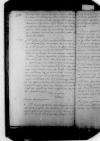List #5745
Alfonso de VALDÉS do Ioannes DANTISCUSPalencia, [1527]-09-12
Regest polski: Valdes cieszy się, że jego działania zyskały akceptację Dantyszka. Dantyszek zawsze może na niego liczyć. Valdes zastosuje się do rady Dantyszka w sprawie starca [kanclerza Gattinary]. Swój przyjazd do Palencji uznał w tej sytuacji za bardzo potrzebny. Całą sprawę woli zrelacjonować Dantyszkowi ustnie. Wątpi w szybkie zawarcie pokoju z Francją, na co mają nadzieję niektórzy w Palencji. Uważa posunięcia strony francuskiej za próbę odwrócenia uwagi cesarza od Italii. Nie ma nowych wiadomości z Węgier ani z Genui. Znalazł wygodne mieszkanie, oferuje je także Dantyszkowi, gdyby ten przyjechał.
| odebrano Paredes de Nava, [1527]-09-12 Rękopiśmienne podstawy źródłowe:
Pomocnicze podstawy źródłowe:
Publikacje:
| ||||||||||||||||||||
Tekst + aparat krytyczny + komentarzZwykły tekstTekst + komentarzTekst + aparat krytyczny
Clarissimo viro domino
Salutem plurimam.
Gaudeo, si quid feci aut facio, quod tibi
placeat, measque litteras tibi gratas fuisse habeo gratiam, tua enim
humanitate adeo me tibi devinxisti, ut si omnia a me officia tibi
promiseris, iure tuo facturus sis. De
Postscript:
De pace nihil spero futurum.
Tuus ex animo
